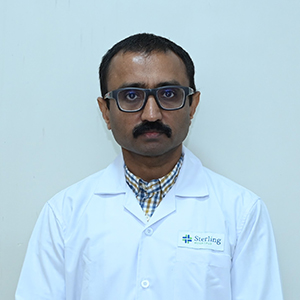Radiology
Radiology is a branch of medicine that uses imaging technology to diagnose and treat disease. Radiology may be divided into two different areas, diagnostic radiology and interventional radiology.
Sterling Hospitals Rajkot, is a leading multi-specialty hospital that offers a comprehensive range of radiology services. The hospital's team of experienced radiologists is dedicated to providing patients with the highest quality of care.
Diagnostic Radiology
Diagnostic radiology aims to provide accurate diagnoses and effective treatment plans that lead to improved patient health outcomes.
Radiologists use diagnostic radiology to see the organs, tissues, and other structures inside the body, and to identify fractures, tumors, infections, and other conditions. Making accurate diagnoses based on these images requires precision, strict attention to detail, and comprehensive knowledge of anatomy and physiology.
Radiologists are also experts in determining the type of imaging study necessary for the patient’s condition or disease. Diagnostic techniques include:
-
Computed Tomography (CT SCAN) —CT scans use X-rays to create images of the body from different angles.
-
Magnetic Resonance Imaging (MRI) — MRIs use a powerful magnetic field and radio waves to create detailed images of the body’s internal organs, bones, and soft tissues.
-
Magnetic Resonance Angiography (MRA) - MRA is a type of MRI used to diagnose and treat conditions that affect the blood vessels, such as aneurysms and peripheral artery disease.
-
Mammography - An X-ray technique used to detect abnormalities or cancer in the breast tissue.
-
X-rays - are the oldest and simplest form of imaging. They use electromagnetic radiation to create images of the bones and other structures inside the body.
-
Ultrasound - uses sound waves to create images of the body’s internal structures.
Interventional Radiology
Interventional radiology is a branch of radiology that uses imaging technology to diagnose and treat conditions. It’s minimally invasive because it doesn’t require the use of surgery. Instead, it uses imaging techniques to guide catheters and other instruments through the body to the area requiring attention.
Interventional radiology can be used to:
-
Diagnose vascular diseases such as aneurysms or peripheral artery disease
-
Embolize tumors to stop their growth
-
Insert stents for blocked arteries
-
Remove blood clots from veins or arteries
-
Ablate tumors without surgery
-
Place feeding tubes into the stomach through small incisions rather than open surgery
-
Perform biopsies to diagnose cancer and other conditions
-
Drain abscesses
Using imaging technologies before a procedure gives a greater understanding of anatomy, leading to improved treatment precision. This reduces potential side effects as only affected areas are targeted rather than a wider area which could affect healthy tissue. Furthermore, interventional techniques can offer a quicker diagnosis, allowing for earlier treatment and improving patient outcomes.
This field of radiology has grown in recent years due to its benefits over traditional open surgeries. In many cases, it’s much less traumatic for patients, requires shorter recovery times, carries less risk of complications, and can provide effective results.
Some of the most common interventional radiology procedures include:
- Angiography: Angiography is a procedure that uses X-rays to visualize the blood vessels in the body. Angiography is often used to diagnose and treat blockages in the arteries.
-
Cath procedures: Catheter procedures are minimally invasive procedures that use a thin tube (catheter) to access the body's blood vessels. Catheter procedures are often used to treat blockages in the arteries, heart disease, and other conditions.
-
Embolization: Embolization is a procedure that uses small particles to block blood flow to a tumor or other abnormal tissue. Embolization is often used to treat cancer and other conditions.
-
Radiofrequency ablation: Radiofrequency ablation is a procedure that uses heat to destroy abnormal tissue. Radiofrequency ablation is often used to treat cancer and other conditions.
Sterling Hospitals Rajkot, offers a comprehensive range of radiology services, including diagnostic radiology and interventional radiology. The hospital's team of experienced radiologists is dedicated to providing patients with the highest quality of care.
The hospital's radiology department is equipped with state-of-the-art imaging technology, including X-ray machines, CT scanners, MRI machines, and ultrasound machines. This technology allows radiologists to create detailed images of the body's internal structures, which can be used to diagnose a wide range of conditions.
The hospital's radiology department also offers a variety of interventional radiology procedures. These procedures are used to treat a wide range of conditions, including cancer, heart disease, and stroke.
Benefits of Radiology
Radiology offers a number of benefits over other diagnostic methods, including:
It is non-invasive, meaning that it does not require surgery or other invasive procedures.
- It is relatively painless.
-
It is quick and easy to perform.
-
It can provide detailed images of the body's internal structures.
-
It can be used to diagnose a wide range of conditions.
Radiation Safety
Radiation is a form of energy that can be harmful to the body. However, the amount of radiation used in diagnostic radiology is very low and is not considered to be a significant risk.
If you are concerned about radiation exposure, you can talk to your radiologist about the risks and benefits of the procedure.
Conclusion
Radiology is a valuable tool for diagnosing and treating a wide range of conditions. Sterling Hospitals Rajkot, offers a comprehensive range of radiology services, including diagnostic radiology and interventional radiology. The hospital's team of experienced radiologists is dedicated to providing patients with the highest quality of care.
Call to Action
If you are experiencing any symptoms that may be indicative of a medical condition, please schedule an appointment with a radiologist at Sterling Hospitals Rajkot, Ahmedabad. The radiologist will be able to assess your symptoms and recommend the best course of treatment.











